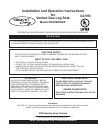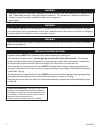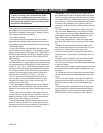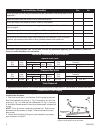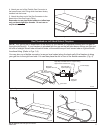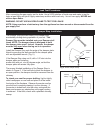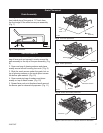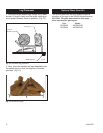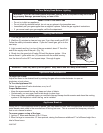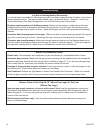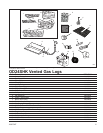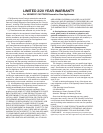
20007967
3
The Logsets have been designed and tested to oper-
ate safely when installed according to the installation
instructions contained in this manual. Read all instruc-
tions before starting the installation.
• For outdoor use only.
• The logset should be inspected before use and at
least annually thereafter. More frequent cleaning may
be necessary because of excessive lint from carpeting
or bedding material.
• In the United States, the installation and operation
must conform to local codes or, in the absence of local
codes, with the National Fuel Gas Code, ANSI Z223.1/
NFPA 54, latest edition, CSA B149.1 Installation Code,
and with the National Electrical Code, ANSI/NFPA70
(latest edition).
• The gas logset and its individual shutoff valve must be
disconnected from the gas supply piping system during
any pressure testing of that system at test pressures in
excess of 1/2 p.s.i.g. (3.5 kPa) The gas logset must be
isolated from the gas supply piping system by closing
its individual manual shutoff valve during any pressure
testing of the gas supply piping system at test pres-
sures equal to or less than 1/2 p.s.i.g. (3.5 kPa)
• Do not, under any circumstances, burn solid fuel
(wood, paper, coal) in the fireplace where you have
installed your logset. Do not use it for cooking. Put
nothing on top of the logs.
• The logset must be compatible with its fuel. Natural
gas requires different hardware than propane. Never
attempt to use natural gas with a propane logset or vice
versa.
• For a propane burning logset, the supply tank must
include a high to low gas pressure regulator. The tank
must be outdoors. Do not, under any circumstances,
locate supply tanks inside any structure.
• The fireplace must include a screen made of chain
mesh or a similar material. You must keep the screen
closed at all times during the operation of the logset; it
will protect you in the event of an explosion.
• WARNING: If the fireplace contains glass doors,
they must remain open at all times during the opera-
tion of the logset, allowing combustion air to circulate.
• In order to avoid any possible gas leaks, apply pipe
joint compound to all non-flared threaded connections
involved in this installation. For propane, the joint
compound must be resistant to the corrosive action of
propane.
• To check for leaks, always use a soapy water solu-
tion or a sniffer. Never test by using an open flame.
• The area around the gas logset must be free of all
combustible materials, especially gasoline or other
highly flammable, vapor producing liquids.
• Due to high temperatures, locate this logset away
from both high traffic areas and furniture and draper-
ies.
• Children and adults alike should be aware of the
high surface temperatures; to avoid the risk of burns
or ignition of clothing they should stay away.
• Do not touch any part of the logset other than the
controls while it is operating or immediately after you
turn it off.
• Supervise young children and pets carefully when
they are in the area where the logset is operating.
• Do not place clothing or other flammable material on
or near the logset.
•Make sure that any safety screen or guard, removed
during servicing, has been replaced before you use
the logset.
• It is imperative that you keep clear all burner areas,
control compartments and passageways for circulat-
ing air.
• Do not move the logset in any way that might dis-
lodge the logs from their fixed positions. If you bump
the logset check to see if you have dislodged any-
thing.
• Provide adequate clearances around air openings
into the combustion chamber and adequate acces-
sibility clearance for servicing and proper operation.
NEVER obstruct the front opening of the fireplace.
General Information
In order to assure a safe and effective instal-
lation, only a qualified service person who is
familiar with the building codes and installation
techniques appropriate to your area may install
and service this appliance.



